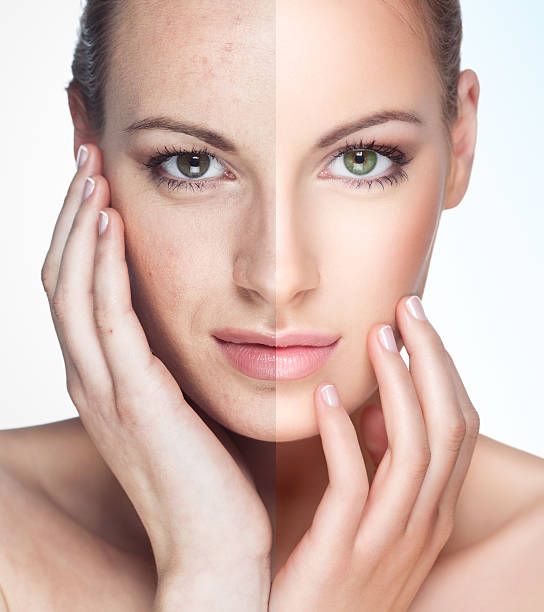I. Introduction
Acne is a common medical condition that affects people of all ages and backgrounds. It can cause pimples, blackheads, and painful cysts or nodules. Understanding acne is crucial for effective treatment, managing psychological effects, and preventing long-term skin damage.
Importance of Skin in Human Health
The skin is the largest human organ and serves multiple functions, such as protecting against environmental hazards, regulating body temperature, and providing sensory information. Healthy skin is often seen as a reflection of overall well-being. However, when afflicted by conditions like acne, The health and appearance of the skin can cause physical discomfort and psychological distress.
Overview of the Essay Content
This essay delves into the multifaceted world of acne. We will explore what acne is, the different types it manifests as, and its prevalence and impact on individuals’ lives. This comprehensive examination aims to provide a deeper understanding of acne, debunk common myths, and offer insights into effective management strategies.
II. Understanding Acne
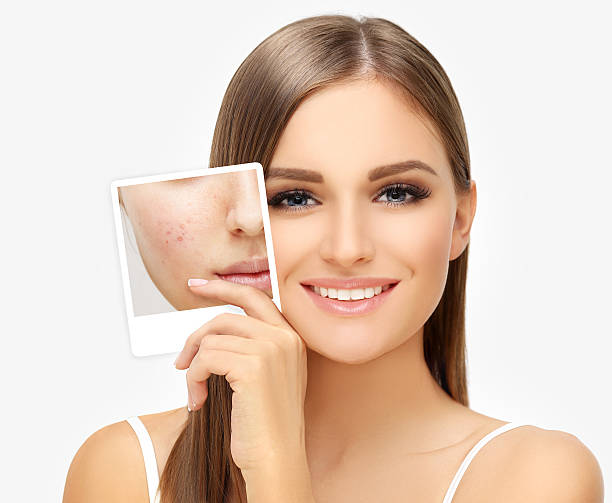
What is Acne?
Acne is a skin condition that happens when hair follicles get blocked with oil and dead skin cells. Acne can manifest in different forms, ranging from mild (blackheads and whiteheads) to severe (painful cysts), and it typically appears on the face, chest, and back. It is not just a condition that affects teenagers; it can also persist or develop in adulthood.
Types of Acne
Non-inflammatory Acne: Blackheads and Whiteheads
Non-inflammatory acne includes blackheads and whiteheads. Blackheads, or open comedones, occur when pores are clogged with a mixture of sebum and dead skin cells. Despite being blocked, the top of the pore remains open. Whiteheads, or closed comedones, form when the pore is entirely closed, trapping sebum, skin cells, and bacteria inside. They have a white appearance on the surface.
Inflammatory Acne: Papules, Pustules, Nodules, and Cysts
Inflammatory acne is more severe and can lead to skin damage and scarring. Papules are small, red, raised bumps caused by infected hair follicles. Pustules and papules are similar, but pustules contain pus. Nodules are painful lumps beneath the skin, while cysts are large, pus-filled lesions that can cause scarring.
Prevalence and Impact on Quality of Life
Acne is one of the most common skin conditions worldwide, affecting millions of people. While it is most prevalent during adolescence, affecting up to 85% of teenagers, adult acne is also a significant issue. The impact of acne on quality of life can be substantial, leading to decreased self-esteem, anxiety, and, in severe cases, depression. Understanding the prevalence and impact of acne is crucial in appreciating the importance of proper treatment and management.
III. The Science Behind Acne
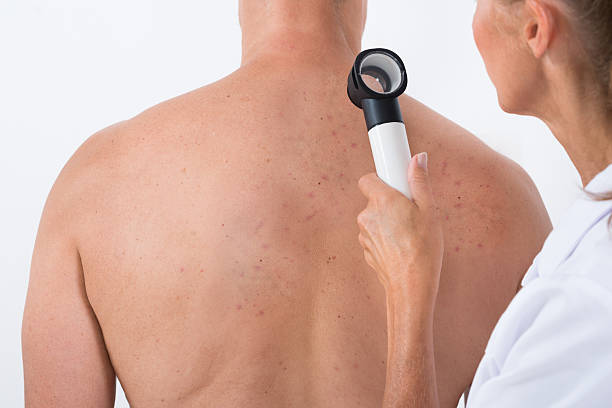
Causes of Acne
Hormonal Changes
Hormonal changes are a primary factor in the development of acne. During puberty, the increased production of androgens (male hormones present in both males and females) leads to enlarged sebaceous glands and increased sebum production. This hormonal fluctuation is also a key reason why women may experience breakouts during menstrual cycles, pregnancy, or when using specific birth control methods.
Genetics
Genetics plays a pivotal role in acne development. If a person’s parents had acne, they are more likely to develop it as well. This genetic predisposition affects how the skin reacts to hormonal changes and may influence the severity and type of acne one experiences.
Diet and Lifestyle Factors
Diet and lifestyle factors can also influence acne. Diets high in sugar and dairy products have been linked to increased acne severity. Acne can be worsened by stress, lack of sleep, and certain medications; on the other hand, Maintaining a healthy lifestyle and following a balanced diet can aid in managing and enhancing the condition of acne.
The Role of Sebum and Skin Bacteria
Sebum, an oily substance produced by the sebaceous glands, plays a crucial role in the development of acne. While it usually helps to keep the skin hydrated and protected, excessive sebum production can lead to clogged pores. The bacteria Propionibacterium acnes (P. acnes) thrives in these oily environments, leading to inflammation and the formation of acne lesions.
Inflammation and Acne
Inflammation is a critical component of acne. The body’s immune response to P. acnes bacteria in clogged pores leads to redness, swelling, and the formation of pus-filled lesions. Managing inflammation is, therefore, a critical aspect of treating acne effectively.
IV. Acne in Different Life Stages

Adolescent Acne
Adolescent acne is the most common form, typically beginning at puberty and caused by hormonal changes. This type of *acne* often presents as a mixture of blackheads, whiteheads, and sometimes more severe forms like cysts. Proper skincare and early treatment can help manage adolescent *acne* effectively.
Adult Acne
Acne in Women
Adult women can experience acne due to hormonal fluctuations related to menstrual cycles, pregnancy, and menopause. This type of acne often presents along the jawline and chin and may fluctuate in severity throughout the menstrual cycle. Understanding and managing hormonal influences are vital in treating acne in women.
Late-Onset Acne
Late-onset acne refers to acne that appears for the first time in adults aged 25 and older. It can be particularly challenging to manage due to its association with aging skin and other adult life stressors. Identifying the underlying causes, which can range from hormonal changes to stress and lifestyle factors, is crucial for effective treatment.
V. Diagnosis and Assessment of Acne
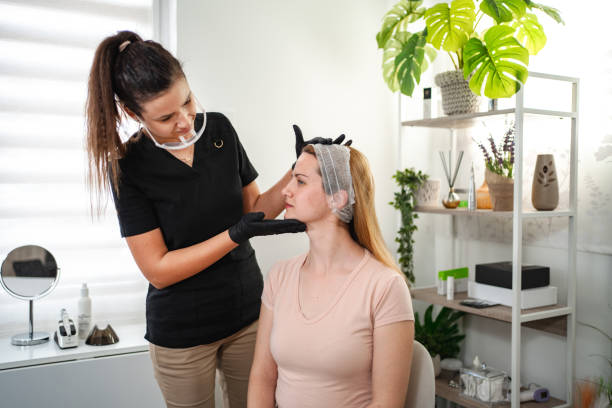
When to See a Dermatologist
Determining when to seek professional help for acne is crucial. If over-the-counter treatments are ineffective, or if acne is severe, painful, or causing significant emotional distress, it’s advisable to consult a dermatologist. Additionally, if acne is leaving scars or if there’s a sudden onset of adult acne, a professional assessment is recommended. Dermatologists can provide a more precise diagnosis and tailored treatment plan.
Assessing the Severity of Acne
Assessing the severity of acne involves examining the type, number, and distribution of acne lesions. Mild acne typically includes non-inflammatory lesions like blackheads and whiteheads. Moderate acne may involve inflammatory lesions like papules and pustules. Numerous large, painful nodules and cysts characterize severe *acne*. This assessment helps in choosing the most effective treatment approach.
VI. Conventional Acne Treatments
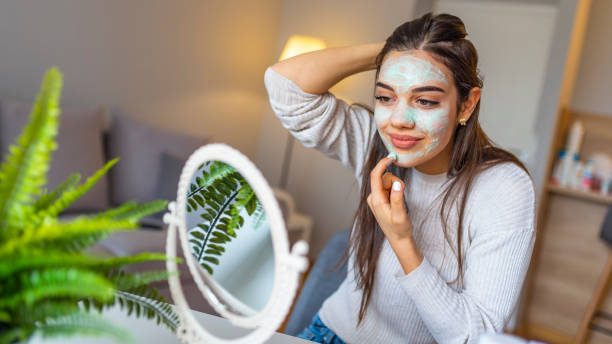
Topical Treatments
Benzoyl Peroxide
Benzoyl peroxide is a standard and effective topical treatment for acne. It is known for its ability to reduce inflammation and kill P. acnes bacteria. It helps prevent pore clogging and is available in various strengths. While effective, it can cause skin dryness and irritation, so it’s essential to start with a lower concentration and gradually increase as needed.
Salicylic Acid
Salicylic acid is another widely used topical treatment. It exfoliates the skin and unclogs pores, making it practical for treating blackheads and whiteheads. Like benzoyl peroxide, salicylic acid concentrations vary, and finding the right balance to avoid skin irritation is critical.
Oral Medications
Antibiotics
When dealing with moderate to severe acne, doctors may prescribe oral antibiotics to reduce inflammation and combat bacteria. Common antibiotics used for acne treatment include doxycycline and minocycline. However, it’s important to avoid long-term use of antibiotics in order to prevent antibiotic resistance. Usually, these antibiotics are prescribed alongside topical treatments to maximize their effectiveness.
Hormonal Treatments
Hormonal treatments, such as oral contraceptives and anti-androgens, can be effective, especially in women with acne linked to hormonal imbalances. These treatments regulate hormones that can cause acne and are often used in conjunction with other acne treatments.
Isotretinoin
Accutane (isotretinoin) is an oral medication used to treat severe cystic acne by reducing sebum production. Medical supervision is required due to potential side effects.
VII. Natural and Alternative Remedies

Dietary Changes and Supplements
Maintaining a healthy diet is a crucial aspect of achieving good skin. It is recommended to avoid consuming refined sugars and dairy products to help reduce the chances of getting acne. Instead, it is advisable to incorporate fresh fruits, vegetables, whole grains, and lean proteins into one’s diet. Additionally, taking supplements rich in Zinc, omega-3 fatty acids, and vitamins A and E can also help improve skin health and alleviate acne symptoms.
Herbal Remedies and Essential Oils
*Acne* can be managed naturally through herbal remedies and essential oils. Tea tree oil’s antibacterial properties fight P. acnes bacteria. Topical green tea extract can reduce sebum production and inflammation. However, it’s important to use these remedies with caution as they can sometimes cause skin irritation, especially if you have sensitive skin.
Lifestyle and Skincare Routine Adjustments
A healthy lifestyle, including adequate sleep, stress management, and regular exercise, can positively impact acne. Skincare routines should include gentle cleansing, non-comedogenic moisturizers, and sunscreen. Overwashing or using harsh scrubs can aggravate acne, so gentle care is critical.
VIII. Dealing with Acne Scars
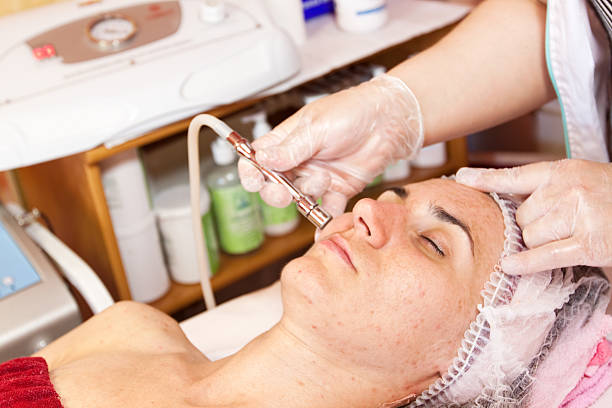
Types of Acne Scars
Acne can leave various types of scars. The most common are atrophic scars, which appear as indentations in the skin. Hypertrophic scars, which are raised and often on the back and chest, occur less frequently. Post-inflammatory hyperpigmentation, which isn’t an actual scar but a discoloration left after an *acne* lesion has healed, is also common.
Professional Treatment Options
Laser Therapy
Laser therapy is a widely used treatment for acne scars, especially for atrophic scars. This procedure involves removing the outer layer of skin or stimulating new collagen production to reduce scars. The type of laser used for the treatment may vary depending on the type of scar and the individual’s skin tone.
Chemical Peels
Chemical peels involve applying a chemical solution to the skin, which exfoliates the top layers and can improve the appearance of mild scarring. Peels range from superficial to deep, with the latter offering more dramatic results but also requiring a longer recovery time.
At-Home Care for Acne Scars
While professional treatments are often more effective, there are at-home care options. These include over-the-counter topical treatments containing ingredients like retinoids, alpha hydroxy acids, and vitamin C, which can help in gradually reducing the appearance of scars and improving skin texture.
IX. The Psychological Impact of Acne
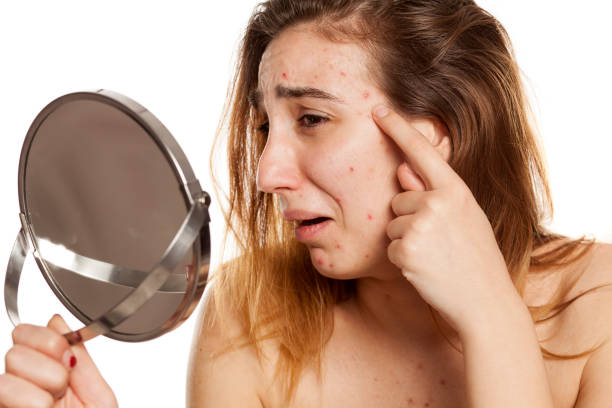
Self-Esteem and Social Anxiety
*Acne* especially when severe, can significantly impact a person’s self-esteem and confidence. This skin condition is often visible and can attract unwanted attention or even lead to bullying, particularly in teens. As a result, individuals with *acne* may experience social anxiety avoiding social interactions due to feelings of embarrassment or self-consciousness about their appearance.
Coping Strategies and Support
Developing effective coping strategies is essential for those dealing with the psychological impacts of acne. Seeking support from friends, family, or support groups can provide a sense of community and understanding. Engaging in activities that boost self-esteem and practicing self-care can also be beneficial. In some cases, professional help from a therapist may be needed to address underlying issues of anxiety or depression.
XI. Myths and Misconceptions About Acne

Debunking Common Myths
Several myths surround acne, often leading to misconceptions about its causes and treatments. One common myth is that *acne* is caused solely by poor hygiene; while cleanliness is essential, acne is primarily driven by hormonal and genetic factors. Another myth is that only teenagers get *acne* in reality, many adults experience *acne* too. Debunking these myths is crucial for proper understanding and management of the condition.
Understanding the Facts
Understanding the facts about *acne* helps in managing it effectively. Acne is a complex condition influenced by various factors, including hormones, genetics, and lifestyle. It’s not just a cosmetic issue but a medical one that can benefit from professional treatment. Recognizing that *acne* can affect anyone, regardless of age or cleanliness, is critical to breaking down stigma and ensuring those affected seek appropriate care.
XII. Acne Prevention Tips

Skincare Best Practices
Maintaining a proper skincare routine is pivotal in preventing acne. This includes cleansing the skin twice daily with a gentle, non-comedogenic cleanser to remove excess oil and dirt. It’s essential to avoid over-washing or using harsh scrubs, as this can irritate the skin and exacerbate *acne*. Using oil-free, non-comedogenic moisturizers and sunscreens is also crucial, as they don’t clog pores. Regularly changing pillowcases and cleaning items that come into contact with the face, like phone screens, can also help in preventing *acne*.
Lifestyle Choices for Acne Prevention
Lifestyle choices play a significant role in *acne* prevention. This includes maintaining a balanced diet low in refined sugars and dairy, staying hydrated, and avoiding tobacco and excessive alcohol consumption. Managing stress through activities like yoga, meditation, or regular exercise can also positively impact skin health. It’s equally important to maintain a regular sleep schedule and get enough sleep for overall skin health.
XIII. Case Studies and Success Stories
Personal Journeys with Acne
This section would include narratives from individuals who have experienced *acne* and their journeys towards managing it. These personal stories can offer insights into the emotional and physical challenges faced and how different treatments, lifestyle changes, and coping strategies helped them.
Lessons Learned and Tips Shared
Valuable lessons and tips can be gleaned from these personal journeys. This could include advice on navigating skincare routines, finding the right dermatologist, or mental health support strategies. Sharing these insights can provide hope and practical guidance for others dealing with *acne*.
XIV. A Comprehensive Look at Acne Management

Recap of Key Points Discussed
In conclusion, this article has thoroughly explored acne, covering its causes, treatments, psychological impact, and prevention strategies. Understanding that *acne* is a multifactorial condition influenced by genetics, lifestyle, and environmental factors is critical to its effective management.
Encouragement for Ongoing Education and Consultation with Professionals
Staying informed about *acne* and its treatments is essential, as research and technologies are continually evolving. Consulting with dermatologists and skincare professionals for personalized advice and treatment plans is highly recommended for anyone struggling with *acne*.
Frequently Asked Questions
Q1: Can diet affect acne?
A: Yes, diet can influence *acne*. Foods high in sugars and dairy products may worsen *acne* in some individuals.
Q2: Is acne only a teenage problem?
A: No, *acne* can affect people of all ages, including adults.
Q3: Can stress cause acne?
A: Stress doesn’t directly cause *acne*, but it can exacerbate it by influencing hormone levels and immune response.
Q4: Are natural remedies effective for acne?
A: Some natural remedies, like tea tree oil, may help with mild *acne*, but they must be used cautiously.
Q5: Can washing your face frequently prevent acne?
A: Overwashing can actually irritate the skin. Gentle cleansing twice a day is recommended.
Q6: Are there long-term effects of acne?
A: Severe *acne* can lead to scarring and have long-term psychological effects.
Q7: Can makeup cause acne?
A: Some makeup products can clog pores and worsen *acne*. It’s advisable to use non-comedogenic products.
Q8: How long does it take for acne treatments to work?
A: It varies, but many treatments can take several weeks to months to show results.
Q9: Is sunlight good for acne?
A: While limited sun exposure might temporarily improve *acne*, it can also lead to skin damage. Sun protection is essential.
Q10: Is *acne* contagious?
A: No, *acne* is not contagious and cannot be spread from person to person.
Books and more reading
- *Acne*: Causes and Practical Management” by F. William Danby: This book offers an in-depth look at acne, from causes to treatment options, written by a renowned dermatologist.
- “The Acne Cure” by Terry J. Dubrow and Brenda D. Adderly: A guide that provides insights into various *acne* treatments and skincare regimens.
- “Healing Adult Acne: Your Guide to Clear Skin and Self-Confidence” by Richard G. Fried
Read also.. Skincare: The Roadmap to Radiant Skin

